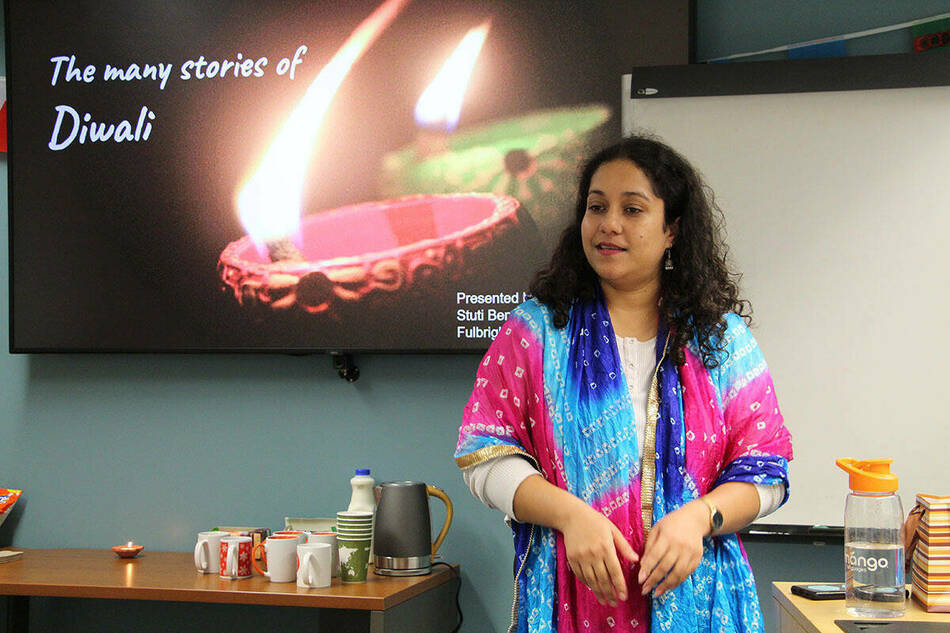
“Names are a very good beginning in efforts for inclusivity.”
When Fulbright Foreign Language Teaching Assistant (FLTA) Stuti Benal taught and took classes on Notre Dame’s campus last year, she found that administrators and her fellow FLTAs at the Center for Languages and Cultures, her academic home and a frequent collaborator with Notre Dame International, took time to learn how to pronounce her name correctly. They then called her by her name simply and directly, not remarking on her name’s “exoticness” or drawing attention to their own efforts in pronouncing it.
“They were also interested in learning the meaning of my Hindi name, which is ‘prayer song,’” Benal says.
Yet, she notes, that atmosphere was somewhat of a “cocoon.”
She has friends and colleagues who have had a very different experience. Some have been introduced to people who have refused outright to say a name they deem “unpronounceable.” Others have encountered a new acquaintance who decides to “rename” them—so that, for example Aanandini becomes “Ann.”
Because her given name, Stuti, has two syllables and a phonetic structure that seems familiar to the average English-speaker, Benal says that most people generally say her name with little hesitation. They may not grasp the subtleties of a soft “St” or the correct placement of the accent, but she feels that usually it is a close approximation, a good effort. When new acquaintances stumble repeatedly on her name or hesitate, she might suggest that they use an abbreviated name, “Stu.” At least, she says, “it has half the sound of my given name.”
Out of her “cocoon,” and as do many who have a name that may seem difficult at first glance to pronounce, Benal had a “Starbucks name” on campus and in the community—usually “Sophie.” Once, though, she gave her name as “Clare” when awaiting a carry-out order. She laughs now when she recounts that the friend waiting along with her had to prompt her to claim that order.
“Clearly, she says, ‘Clare’ meshed with my identity so little that I didn’t even respond to it.”
Connection between names, identity, and inclusiveness
Now teaching at the Université de Franche-Comté in Besançon, France, Benal will join virtually on November 16 with Mary Davis, assistant director of the Center for Languages and Cultures, and Zana Karabatak associate director of International Student and Scholar Affairs, Notre Dame International, to lead an online workshop designed to guide faculty, staff, and students on the proper pronunciation of Hindi names.
All three workshop leaders are passionate about the importance of recognizing the connection between a name and a person’s identity. They are passionate as well about the responsibility of each member of a community to learn to pronounce the names of all its members correctly.
“To fulfill Notre Dame’s aspirations to be a community that honors diversity and strives for inclusivity,” Karabatak says, “there must be more than the one-way movement of people at Notre Dame going to the University’s global centers and gateways. Being a global citizen is a shared responsibility. It encompasses not only studying internationally but, on campus, demonstrating a personal responsibility to bridge cultures.”
All around the world, parents choose a name with great consideration. Learning to pronounce that name correctly honors a student’s or colleague’s identity as well as their culture.

It takes intention and, often, some effort.
“We know that many people struggle to pronounce names that sound foreign to them,” Davis says. “At times, even attempting that pronunciation can make a person feel uncomfortable or nervous and they may be tempted to use another ‘easier’ name, a nickname, or even avoid addressing the person at all. Any of those actions, however, can cause someone to feel excluded from the community. The better way requires effort—often, minimal—to learn how to pronounce a person’s name.”
With that philosophy as the foundation, Davis and Karabatak created a workshop last February on the pronunciation of Mandarin names. Led by Fulbright FLTA Cin-Hua Chen, over 100 attendees gathered online that day. Comments were so positive that this semester’s Hindi name workshop is modeled on the Mandarin name workshop’s general outline and format, which includes the following:
- A few personal name stories that highlight the connection between a person’s name and their identity
- Challenging the mindset that certain names are “impossible” to pronounce
- Demonstrating the linguistic building blocks of a language
- Small-group practice sessions.
Take-aways from the Mandarin Name Pronunciation Workshop
Reflecting on that workshop now from her current base in Singapore, Chen says that the underlying message of the name pronunciation initiative is: “Names are a very good beginning in efforts for inclusivity.”
Her pointers:
- Ask a new acquaintance how to pronounce his or her name.
- Listen intently to try to imitate sounds and accents.
- Repeat the name right away, simply and directly. There is no need to exaggerate sounds or comment on the name’s difficulty or “foreignness.”
- Ask “Is that correct?”
- Then jump right into a conversation about the topic at hand.
Chen joins with her colleagues in emphasizing that effort–actually trying–is the point.
“Your first attempt may not be perfect,” she says, “but it is that effort that displays your willingness to engage with a person. It is how we can all work together to create a multicultural environment.”
Tools at Notre Dame beyond the workshops
A useful tool at Notre Dame available to all is NameCoach. Integrated into Canvas, it allows students and instructors to personally and quickly record the pronunciation of their name. Users voice-record their names within their Canvas account profile, and the recording will be visible when the tool is added to a Canvas course site.
Additionally, Davis and Karabatak emphasize the importance of Notre Dame’s FLTAs in their initiatives related to identity and inclusion.
“The FLTAs do important work for us on campus,” Karabatak says. “Trained in the teaching of language, and coming to campus with a firm commitment to the bridging of cultures, they are a key resource for us.”
The Hindi Name Pronunciation Workshop is part of International Education Week, an opportunity to celebrate the benefits of international education and exchange worldwide. This joint initiative of the U.S. Department of Education (ED) and the U.S. Department of State is part of their efforts to promote programs that prepare Americans for a global environment and to attract future leaders from abroad to study, learn and exchange experiences.
Learn more about the upcoming workshop and register today.
Additional reading/viewing for expanding insights on inclusivity's connection to name pronunciation:
-
Minor Feelings: An Asian American Reckoning - Cathy Park Hong
-
Commentary: The casual racism of mispronouncing an Asian person’s name - LATimes
-
Understanding Name-Based Microaggressions - Psychology Today
-
If You Don’t Know How to Say Someone’s Name, Just Ask - Harvard Business Review
Originally published by at international.nd.edu on November 10, 2023.